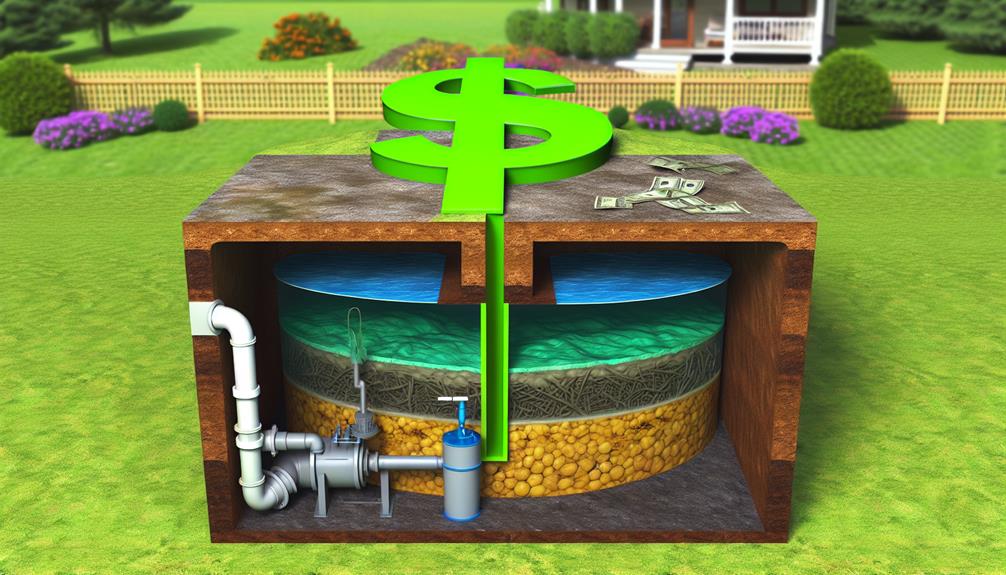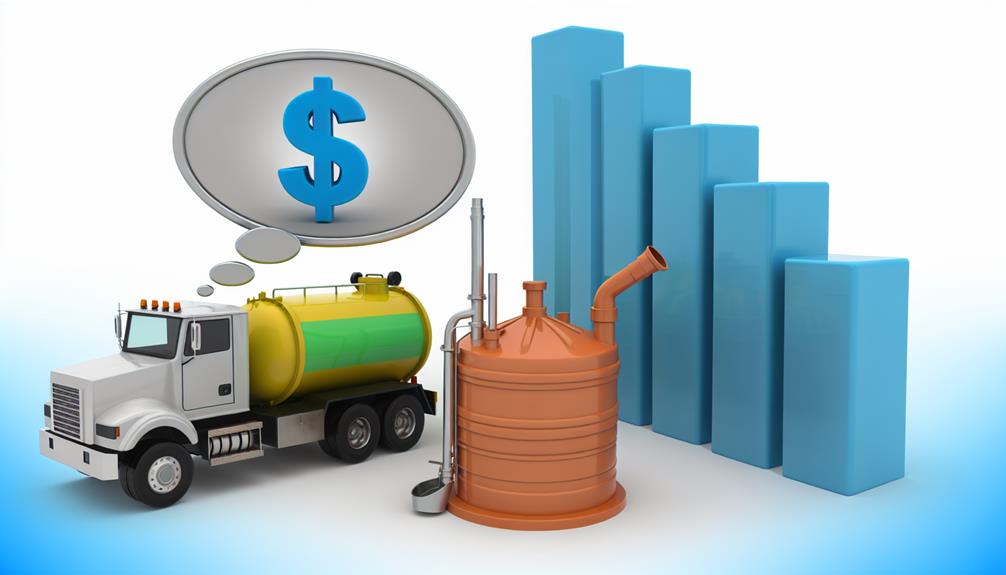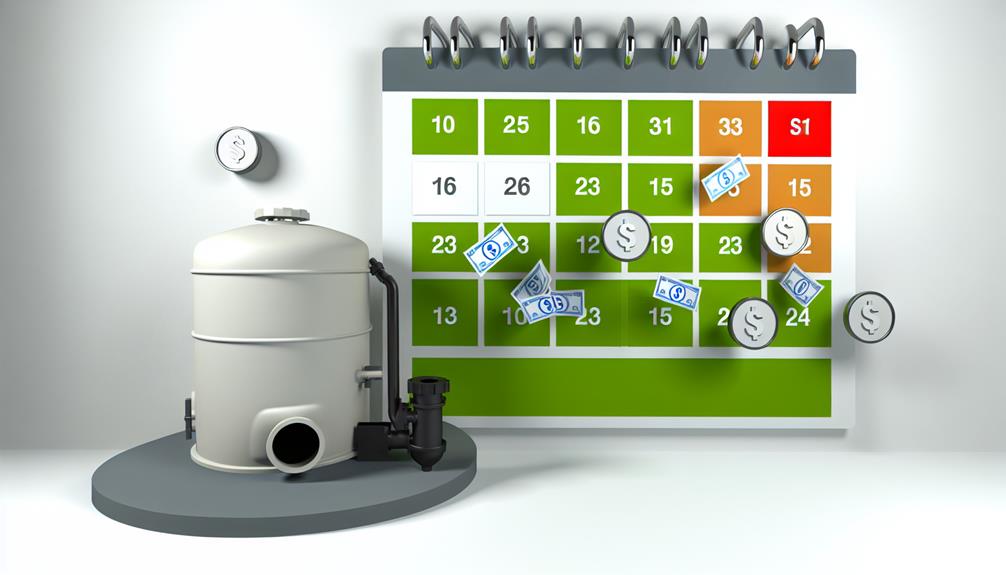Discover how to protect your septic system from breakdown with...
Read MoreYou & Your Septic Tank
Select Guide to Septic Tank Pumping: Average Costs & Frequency
Our professional septic service team offers comprehensive septic tank pumping services to keep your system running smoothly. Get a FREE Quote Today.

Select Guide to Septic Tank Pumping: Average Costs & Frequency
Just as you’re finalizing your expenses for the month, your septic tank decides it needs a pump-out. You’re not alone in this unexpected predicament, it’s an inevitable part of homeownership after all.
Now, you’re probably wondering, ‘How much is this going to set me back?’ and ‘How often do I need to do this?’ Well, you’re in the right place to get some clarity on these concerns.
As you navigate through this guide, you’ll uncover the average costs involved in septic tank pumping and understand the frequency at which it should be done. You’ll also discover some practical tips to save on these expenses.
But first, let’s shed light on what influences these costs.
Key Takeaways
- Septic tank pumping is crucial for maintaining the efficiency of septic systems and preventing overflow and system failure.
- Improperly managed septic systems can contaminate groundwater and harm ecosystems, so regular pumping is important for responsible home ownership and protecting the environment.
- Factors influencing pumping costs include geographical variance, seasonal impacts, septic tank size and condition, transportation costs, and labor costs.
- The average cost of septic tank pumping ranges from $200 to $500, and factors such as tank size, time since the last pump, and local market rates can influence the price. Understanding the average cost helps in budgeting for septic tank pumping.
Understanding Septic Tank Pumping

To fully grasp the importance of septic tank pumping, you have to dive into the nitty-gritty of how septic systems function and why regular maintenance is crucial.
Septic systems treat wastewater from your home by separating solids from liquids in the tank. Over time, solids accumulate, requiring periodic pumping to prevent overflow and system failure.
Septic tank maintenance isn’t just about ensuring your system’s efficiency. It’s also about mitigating the environmental impact. Improperly managed septic systems can lead to the leakage of untreated sewage, contaminating groundwater, wells, and nearby water bodies. This can result in hazardous conditions for humans and wildlife alike, contributing to the spread of disease and harming ecosystems.
Pumping your septic tank regularly is part of responsible home ownership and environmental stewardship. It’s not just about avoiding the unpleasantness of a failing system, but also about protecting your local environment from unnecessary pollution.
Factors Influencing Pumping Costs
Navigating the costs of septic tank pumping, you’ll find several factors can significantly influence the final price. One primary factor is geographical variance. The cost of living and service costs vary from region to region. For instance, if you’re located in a rural area, the transportation costs for the service crew may add to the total cost. Similarly, if you’re in an area with higher living costs, you’ll likely pay more for the same service due to higher labor costs.
Seasonal impacts also play a role. During periods of heavy rain or snow, the ground can become saturated or frozen, making the tank more difficult to access. This can increase labor hours, and subsequently, the cost. Additionally, demand for services can vary by season, affecting availability and prices.
The size and condition of your septic tank also influence costs. Larger tanks take more time and resources to pump, resulting in higher charges. If your tank hasn’t been maintained regularly, it may require more work to pump, which can also increase the cost.
In essence, while the average cost provides a rough estimate, your specific circumstances will determine the exact cost of septic tank pumping.
Average Septic Tank Pumping Costs

Understanding the average cost of septic tank pumping can help you budget for this essential maintenance task.
The price isn’t arbitrary; it’s influenced by several factors such as tank size, the time since the last pump, and local market rates.
We’ll guide you through these considerations so you can anticipate what you might pay for this service.
Determining Pumping Costs
How much can you expect to pay for septic tank pumping? The cost can vary widely, but typically, you’re looking at a range from $200 to $500.
Still, there are factors which might increase these expenses:
- Pump selection: The type of pump required for your septic system can significantly affect the cost. High-quality pumps often come with a higher price tag.
- Hidden expenses: These are costs that aren’t immediately obvious, such as fees for digging to access your tank, or disposal fees for the waste pumped out.
- Tank size: Larger tanks hold more waste, requiring more time and effort to pump, thus costing more.
- Location: If your tank is difficult to access, or if you live a considerable distance from the service provider, additional fees may apply.
Factors Influencing Price
Several factors can influence the average cost of septic tank pumping, making it important for you to be aware of these potential variables.
Geographical variations play a significant role in determining the price. If you’re located in an urban area, the cost may be lower due to the availability of numerous service providers. However, living in a remote region might lead to higher prices because of increased transportation costs.
Service quality is another crucial factor. A company offering comprehensive services, including inspection and repair, might charge more. Yet, it’s often wiser to invest in quality service to ensure your system’s longevity.
Cost Breakdown of Pumping Services
Now let’s discuss the cost breakdown of pumping services.
Understanding the factors that determine pumping prices is key to budgeting for this necessary maintenance.
Various influences can impact cost, and you’ll learn what to expect and how to potentially reduce your expenses.
Determining Pumping Prices
Understanding the cost breakdown of septic tank pumping services is essential in making informed decisions about your system’s maintenance. Pump selection and maintenance practices are crucial factors that affect the overall cost.
Here’s a rough breakdown of what you might expect to pay:
- Pump selection: The type and size of the pump chosen can greatly influence the cost. Larger, more complex systems will cost more.
- Labor costs: The time it takes to pump your tank will factor into the price.
- Maintenance practices: Regular maintenance can prolong the life of your system and potentially reduce costs in the long run.
- Disposal fees: Lastly, the cost to dispose of the waste removed from your tank also contributes to the total price.
Factors Influencing Cost
Delving into the cost breakdown of pumping services, it’s crucial to note that a variety of factors can significantly influence the overall price you’ll pay. Regional variations and pumping techniques, to name a couple, play a significant role in determining the final cost.
Here’s a table for a better visualization:
| Factor | Description | Impact on Cost |
|---|---|---|
| Regional Variations | Costs vary by location due to local regulations, disposal fees, and competition | High |
| Pumping Techniques | The method used can affect labor time and equipment needed, impacting the price | Moderate |
| Tank Size | Larger tanks require more work and thus cost more to pump | High |
| Accessibility | Tanks that are harder to reach or require additional work to access will cost more | Moderate |
Frequency of Septic Tank Pumping

How often should you pump your septic tank? It’s a crucial question when considering pumping risks and tank maintenance. Typically, it’s recommended that you pump your septic tank every 3 to 5 years. However, the specific frequency can vary based on a few factors:
- *Size of your tank*: Larger tanks can generally go longer between pumpings.
- *Number of people in your household*: More people mean more wastewater, requiring more frequent pumping.
- *Amount of wastewater generated*: If your home generates a lot of wastewater, you’ll need to pump more often.
- *Volume of solids in the wastewater*: High volumes of solids can necessitate more frequent pumping.
While it’s tempting to put off tank maintenance to save money, neglecting regular pumping poses serious risks. You could face a system failure, which isn’t only inconvenient but can also be incredibly expensive to fix.
Regular pumping helps maintain your septic system’s efficiency and prolongs its lifespan. Be proactive—schedule regular septic tank maintenance to avoid future headaches.
Saving Money on Septic Tank Pumping
While regular maintenance is essential to keep your septic system running smoothly, it’s also important to consider ways you can save money on septic tank pumping. One method is DIY Pumping. However, it’s crucial to note that this method requires a certain level of technical knowledge and can be hazardous if not performed correctly.
Before considering DIY Pumping, familiarise yourself with the specific equipment needed, safety protocols, and local regulations. Remember, improperly done DIY pumping can lead to costly repairs, so ensure that you’re fully educated before attempting this method.
Another method to save money is by exploring pumping alternatives. One such alternative is the use of bacterial additives. These bacteria help break down the waste inside the tank, reducing the need for frequent pumping. However, this method doesn’t completely eliminate the need for professional pumping but can extend the time between services.
Last but not least, regular inspections and maintenance can help you avoid costly repairs. By keeping your septic system in good working order, you’ll save money in the long run. Remember, an ounce of prevention is worth a pound of cure when it comes to septic tank care.
Conclusion
In sum, septic tank pumping isn’t exactly a medieval torture, but it’s vital for a healthy home.
Various factors influence the cost, with the average being around $300 to $400.
It’s recommended you pump every 3-5 years.
Proactive maintenance can save you a bundle, preventing a disastrous ‘plague’ on your household.
So, don’t let your septic system become a relic of the past – regular pumping is the key to its longevity.
You may also like...
Why Are DIY Fixes Essential for Septic Tank Pumping?
Tap into the importance of DIY fixes for septic tank...
Read MoreUnveiling the Average Costs of Septic Tank Pumping
Master the mysteries of septic tank pumping costs and avoid...
Read More
The Best Septic Tank Pumping Services Near You

Answer Some Questions
Let us know about your needs so we can find you the right septic tank pros.

Get Quotes
We will put you in touch with the right septic tank pros for your job and location.

Hire Right
Compare quotes, message or call pros, and hire only when ready.



